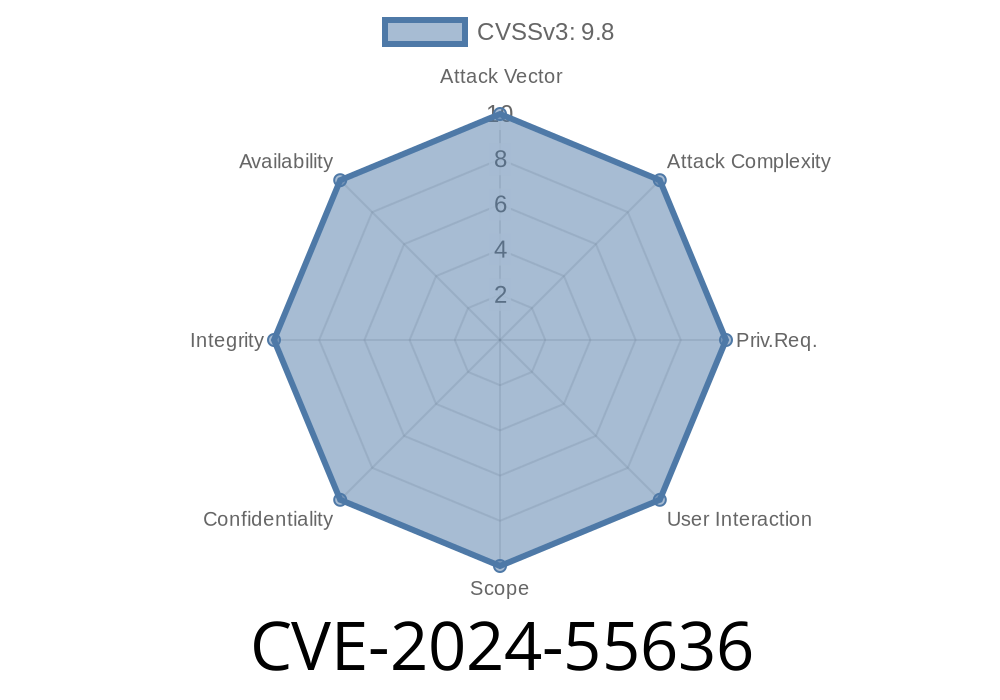CVE-2024-55636 exposes another critical chapter in web security—this time affecting Drupal, one of the world’s most trusted open-source content management platforms. If you're running Drupal Core 8.. to before 10.2.11, 10.3. to before 10.3.9, or 11.. to before 11..8, your system may be at risk.
Let’s break down what this means, how attackers could use it, and what you must do to keep your site safe.
What is the CVE-2024-55636 Vulnerability?
At its core, CVE-2024-55636 is a vulnerability caused by deserialization of untrusted data, leading to possible object injection. Think of it like this: Drupal allows certain types of data to be loaded and manipulated as PHP objects. If a bad actor can feed their own data into this process, they might trick Drupal into creating nasty objects that perform harmful actions.
But it’s not as simple as uploading a dodgy file. This weakness is called a "gadget chain." It doesn't directly let hackers run their code, but gives them the tools—like dominoes lined up and ready—to launch much bigger attacks, especially if another flaw in your site lets them send in serialized (crafted) data.
In plain talk:
If your site deserializes data from someone you don’t trust, a hacker may string together certain Drupal Core classes ("the gadget chain") that can be abused—potentially giving them remote code execution (RCE) abilities.
Suppose there's a class in Drupal Core that looks like this
class DrupalDanger {
public $command;
public function __wakeup() {
// Dangerous method that's triggered during unserialization
if ($this->command) {
eval($this->command); // An attacker could put their code here!
}
}
}
If your site unserializes user data like so
// BAD: unserialize() on untrusted user input
$input = $_POST['data'];
$obj = unserialize($input);
A hacker could POST this to your site
O:12:"DrupalDanger":1:{s:7:"command";s:13:"phpinfo();";}
When PHP unserializes this input, it auto-runs __wakeup, and—boom—phpinfo() is executed!
Drupal Core does not itself directly do this in default setups. However, due to the gadget chain in its codebase, if any plugin, module, or custom code does, then the Core’s gadget chain can be misused for an attack. This is why the bug is so dangerous even if it’s not an *immediate* RCE.
Drupal Security Team:
The Drupal team published an alert for this vulnerability on June 12, 2024, urging everyone to patch immediately.
NIST National Vulnerability Database (NVD):
Full CVE details at nvd.nist.gov/vuln/detail/CVE-2024-55636.
MITRE CVE Entry:
Reference at cve.org/CVERecord?id=CVE-2024-55636.
Locate a Deserialization Weakness:
Attackers first need some way to feed untrusted data into an unserialize function—possibly through an insecurely coded module or even, in rare cases, via logging or caching if not properly handled.
Craft a Serialized Payload:
The attacker creates a PHP serialized string that leverages Drupal’s gadget chain. They string together multiple objects, each triggering a method in the next, eventually running arbitrary PHP code on your server.
Trigger the Gadget Chain:
Posting the payload, the application unserializes it, and—through magic methods like __wakeup() or __destruct()—Drupal’s core code executes harmful commands. At best, this lets attackers read sensitive data. At worst, they get RCE.
A chain may look like this (simplified)
// (Pseudocode, not actual Drupal Core!)
// Imagine classes A, B, and C, each with __destruct or __wakeup
class A {
public $next;
public function __destruct() {
$this->next->run();
}
}
class B {
public function run() {
// Arbitrary code here
}
}
// Serialized input: O:1:"A":1:{s:4:"next";O:1:"B"::{}}
*When A is destroyed (for example, at the end of a request), it calls B's run method, which could run malicious code if crafted by an attacker.*
11.. before 11..8
- Any site with custom code/module that unserializes user input is at special risk.
How to Fix
1. Update Core Immediately:
- Get the latest secure release from Drupal downloads.
2. Audit Code and Modules:
- Search your code for unserialize(), maybe_unserialize(), or serialize() that’s used on untrusted data.
Never unserialize data from users or unknown sources!
3. Monitor Third-party Plugins:
Make sure your installed modules are up to date and follow the same security advice.
4. Use Intrusion Detection:
- Tools like OSSEC or Snyk can notify you about such attacks and outdated modules.
Learn More
- Drupal Core Security Advisory SA-CORE-2024-003
- NVD Entry for CVE-2024-55636
- Drupal Security Best Practices
- PHP Object Injection Explained (OWASP)
Conclusion
CVE-2024-55636 is a classic reminder that even world-class CMS platforms aren’t immune from risky code patterns like deserialization of untrusted data. Patch your Drupal core, review custom code, and never trust user input—especially when it comes to serialization. Stay one step ahead by keeping your codebase clean, updated, and audited.
Timeline
Published on: 12/10/2024 00:15:22 UTC
Last modified on: 12/16/2024 18:15:11 UTC
